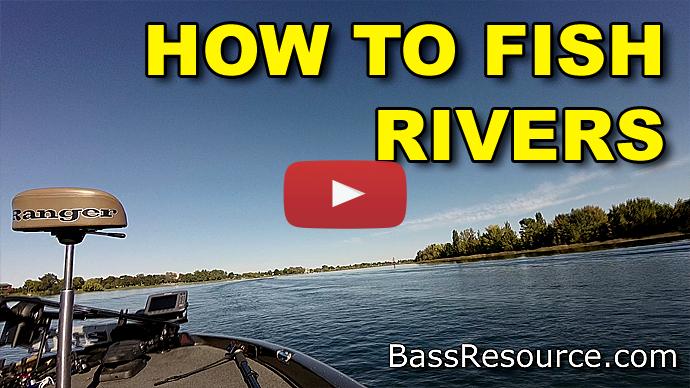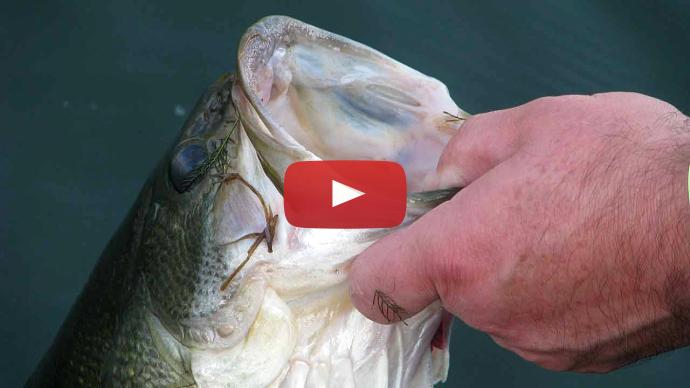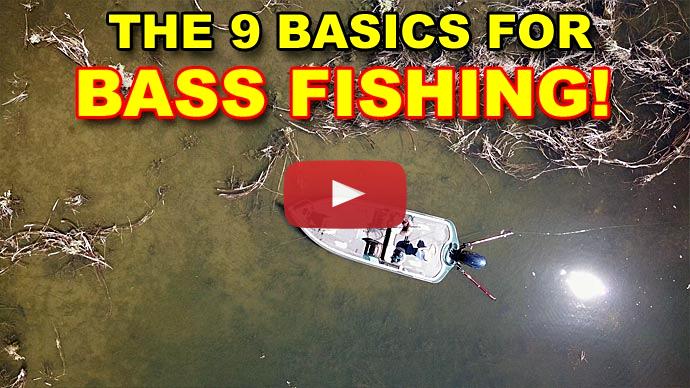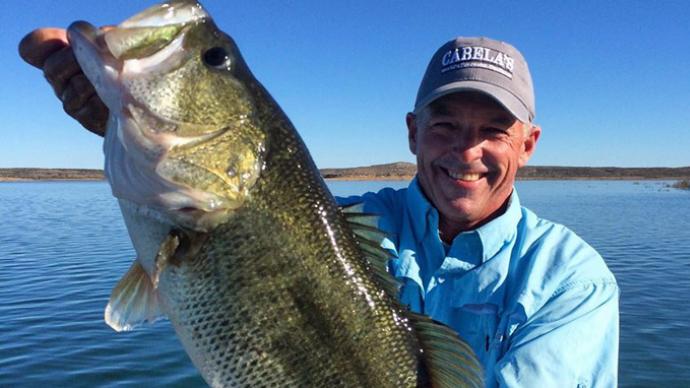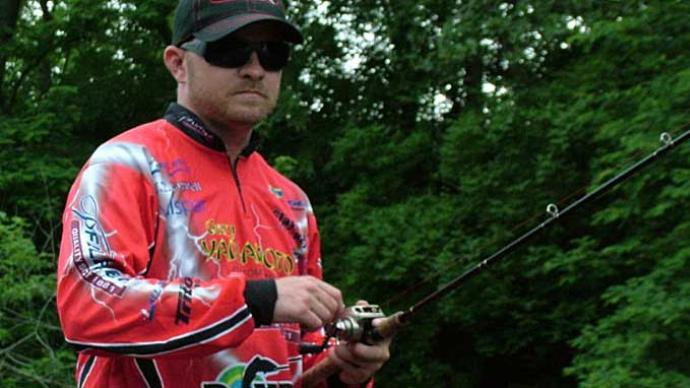Hey, folks. Glenn May here with BassResource.com. Today I want to talk about some of the tips and tricks that can help you become a better angler. I'm going to talk a little bit about some of the stuff that'll, you need to do and then some of the things you should avoid. So let's start off with the stuff you need to do.
Start it off with keeping it simple. First tip I can give you that is, you know, us bass anglers, we like to really analyze things and we sometimes over analyze. We over color. We over technique. Over think lures. We get ourselves, you know, stuck by, you know, paralysis by analysis and work ourselves into a tizzy. Sometimes it's just, you know, keep it simple. Really simple. If the wind is blowing, put the wind at your back, pick up a spinnerbait or crankbait, and just cover water. Or if it's nice and sunny out, there isn't really any wind, pick up a jig or a worm and start picking a part to cover. It's just that straight forward. Keep it simple. You'd be surprised at how easy, how much that works better for you.
Second tip I can give you, is this is especially for a tournament, is throw what you know. A tournament, it really isn't the time to try brand new lures, brand new techniques, or brand new areas that you're not familiar with. Now don't write me and say, "Hey Glenn, I tried a brand new lure during a tournament and it worked really well for me." I'm talking about as a general rule, if you try something brand new during a tournament, it usually doesn't turn out in your favor. So throw what you know. Keep with your confident stuff.
But that takes me to the next tip. And that is you need to be versatile. You need to learn all these different techniques so you have confidence in them. This is especially true, like if you've got something that you really don't like to throw or you're not familiar with, say for example, you hate spinning gear. Or you don't like bait casting gear or Carolina rigs. Whatever it is, go to a lake that's got a lot of fish in it and throw that all day long. Don't put it down. I know the tendency is to put the rod down and pick up something you're more confident with, but the way to get that confidence is to just go out and catch fish with it. Because I promise you there's going to be a time and a place when that is going to be the predominant way to catch fish and you're going to be able to put more fish in your boat if you already feel confident with it. So go out there and learn those techniques.
The fourth tip is time on the water. Nothing beats seat time. You need to get out there and spend time on the water. Watch, you'll learn over time, the little nuances, how the fish change and how they be, how they react to water level that's going up or down. Or if it's a sunny day and then the cloud cover comes in, how that changes them. And when it starts to rain or when the wind picks up or shifts. All these type of things is going to shift the fish around. It's going to change their behavior and the more time you spend on the water the quicker you're going to be able to recognize that and adapt to it. It's going to mean more fish in the boat for you.
The next tip is you have to have realistic expectations of what your day's going to be on the water. You know, we watch all those T.V. shows and even on YouTube, these guys are catching fish after fish after fish and it looks like they're just slaying them. So we have this expectation like, hey, I'm going to go out on the water and do that too. You need to understand those shows sometimes take days to shoot and they're showing you just the highlights. Even on T.V. or those tournament shows, you're just seeing, you know, half an hour, an hour's worth of, you know, three days of fishing. So all compacted into a small amount. So have realistic expectations. That way when you go on the water you think, okay, this is how I approach it. If I'm going to go out on the water, I say, "Look, I really hope this is going to be a great day. I hope I slam them. It'd be really fun." We have great days like that every once in a while. But if the bite isn't on, then what am I going to do? And think through that. If you go out on the water with that mind set, then if you're not slaying them right from the get go, you're not going to be as frustrated and you're going to be able to adapt and be able to change your tactics and get more fish in the boat.
Another tip I can give you, and this is, get better at casting. And I'm not just talking about accuracy. With bass fishing, it's all about accuracy. We know that. But if you can get that lure right next to that log but it comes down with a big splash, you might as well be throwing rocks at the fish. You're going to scare them away. You need to be really accurate with your cast and your entry. Pay real close attention to how soft that lure hits the water. You want as little splash as possible. The more better, the more accurate you can get that lure next to a stump, next to a log, next to a dock with a nice soft entry, the more fish you're going to catch. Practice that as much as you can. It's not about distance.
The next tip I can give you is spend time in the back seat of somebody, the back boat. The back part of the boat, as a back seater. That, I'm telling you what, you're going to learn so much by fishing with other people as a back seater. I spent probably about my first 10 years of tournament fishing, started in my teens, as a back seater, mostly by necessity, but I can't tell you how much I learned from that. Everybody fishes a spinnerbait a little bit different. Everybody fishes a crankbait a little bit different and so on and so forth. They have different knowledge of local bodies of water. They have a different approach to finding fish. They have a different approach to tournaments, tournament tactics. It goes on and on. Even backing boats down the ramp. As a back seater a lot of times at the end of the day you're the one that goes up and gets the rig and you back it down the ramp. Everybody's got a different size boat, different kind of trailer, dual axle, single axle, different kind of towing rigs. That changes the way that the boat will back down the ramp and if you get all that kind of practice, I'm telling you, I'm really good at backing boats down ramps right now because I've done so many. Just little things like that. You'll learn so much by fishing out of the back of someone's boat. Do that. I really recommend doing that.
So those are some of the tips that you should do. Let's talk about some of the stuff you should avoid. The top tip I can give you is avoid the perfect lure syndrome. That is trying to find the exact right color, the exact right bait that's going to catch fish that day. I'm telling you what, it most often boils down to location and presentation more so than it is the bait or the lure. I would much rather throw the wrong lure and the wrong color in the right place than the perfect right lure and the perfect right color in the wrong place. Case in point today, I was throwing chatter baits and the fish didn't really want to hit it. Well, I was burning it by bringing it back to the boat like you normally would a chatter bait. Started fishing it like a jig, throwing it out there and letting it drop and when it hit the bottom then they'd pick it up and set the hook. Not a traditional way of fishing a chatterbait. So I was fishing it the wrong way but if you fished a jig, they actually didn't want to hit that, okay? They actually wanted to hit, I don't know what it was with the chatter bait, the kind of movement, something like that. But don't get locked into thinking one lure only works one way and you got to have that perfect lure and you're going to expand your horizons. You're going to open up to a whole new way of fishing.
The next tip I can give you to avoid is don't fish memories, okay? That is key. A lot of us, it's human nature. If you have success at something, what you want to do is replicate that. It's our tendency to go back and try to do it over and over again because you were successful doing it that way. Us anglers are no different. I've done the exact same thing. You have a great day on the water and the next day, very next day, you go to the same spots and you fish it the same way and you don't catch fish and wonder why. Because you're fishing history. Same thing with if you're out there fishing the week before and you did really well. You come back the next week and you don't catch them the way you were before. What you need to do is focus and be in the moment. What are the fish doing today? Matter of fact, the pros, they'll even break it down to the hour by hour. The fish will change throughout the day as the sun changes, as weather changes, the water temperature changes, the fish will move. They adapt with it because they're in the moment. So try not to fish history. It's great to learn from your experiences but don't try to replicate that the next time you go out fishing. You'll be a much better angler.
Another tip to avoid or another thing to avoid is trying to do too much. And that, what I mean by that is you're trying to learn too much too quick. You know, bass fishing, you can catch fish by so many different lures, so many different techniques and tactics, it's easy to get overwhelmed and there's this rush sometimes to try to learn it all. It's hard to do it that way. What I suggest is you learn three to five tactics or lures that you, until you get comfortable with and you've caught enough fish, you feel really good with it. Then start to expand your knowledge. Start to build upon that success. For me it was fast moving lures. I learned crankbaits and spinnerbaits and top waters, buzz baits, that stuff, I learned that first before I moved onto things such as worms and jigs and drop shot and things like that. Just take it easy. Don't try to learn it all. You got plenty of time. Get some of the basics down. Get confidence with that and then build your experience on top of that and you're going to become a much better angler.
The next tip I can give you is maintain focus or don't lose focus. Okay? One of the things that's really hard to do is be focused throughout the entire day, especially when the bite isn't on. And that is what I mean by maintaining focus is knowing what your lure is doing all the time. Pay attention to what kind of structure it's on. If it's crawling across the bottom? Is it soft bottom? Is it hard bottom? Is it a little bit of pebbles or is it bigger rocks? Get to the point where you can tell rather there's a little weed on it or not. Or here's another way. If you're throwing a grub, can you feel the tail move on that grub? If you're throwing a jig and you have a Rage trailer on it, can you feel it move through the water as it falling down? Okay, focus and see if you can tell that because sometimes the bites are so subtle that if you're not paying attention, you don't know what your lure's doing, you're going to miss that. The other thing is also when you get bit you'll know exactly what you were doing. You'll be able to tell exactly where that bait was, how you were moving it across the water. What you did to elicit that bite so you can duplicate that and get a pattern going. If you're out looking around, the scenery, and talking with your buddy and oh, suddenly got a bite. You don't know what you were doing it's hard to replicate that. Sure, you got to look up and pay attention to what's going on in your surroundings. You need to see if the cloud cover is changing, if rain is coming, if the wind's picking up, did the bird activity pick up? Be observant of your surroundings because that will help you catch fish too, but always be aware exactly what your lure is doing at all times and that'll put more fish in your boat.
The last tip I want to give you is dock talk. Avoid dock talk. And this is just, what I mean by that is anybody tells you how they were catching fish today or the other day or the day before, it's so easy for us to say, how are you catching? How are you doing? And then you try to go out and do that again. And surprisingly, or not surprisingly, it's not too often that we're very successful in doing that. The reason is simple. All of us fish differently. We have a different way of fishing stuff. If someone told you he was fishing a Rat-L-Trap down this certain bank, you know, last week, first of all, you're fishing history. Just like I told you before. But they're going to have a different speed of it. They're going to have a different way of casting it. They're going to have a different way of fishing it and so it's hard for you to replicate that. Typically all's I want to know if someone had a really good day on the waters. You know, how deep were the fish and what were they positioned on? That gives me an idea of how, where they're located and then I'll take it from there and figure out what's going on for that day.
I hope those tips help. For more tips and tricks and for the answers to all your questions about bass fishing, visit BassResource.com

